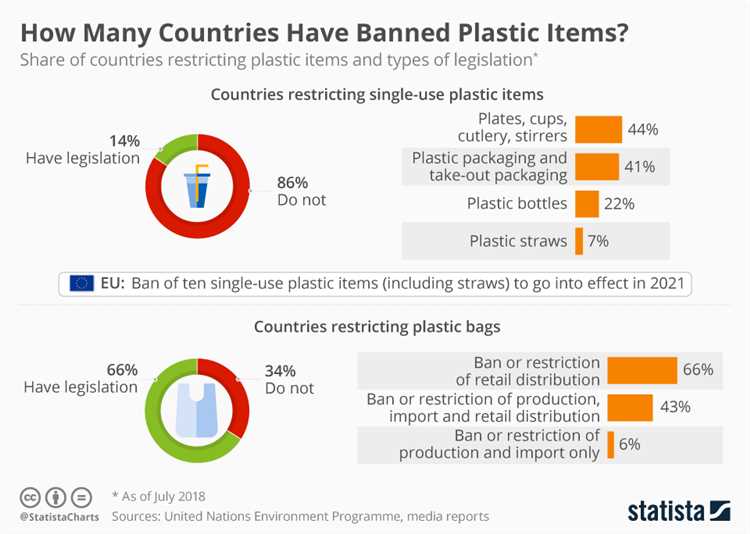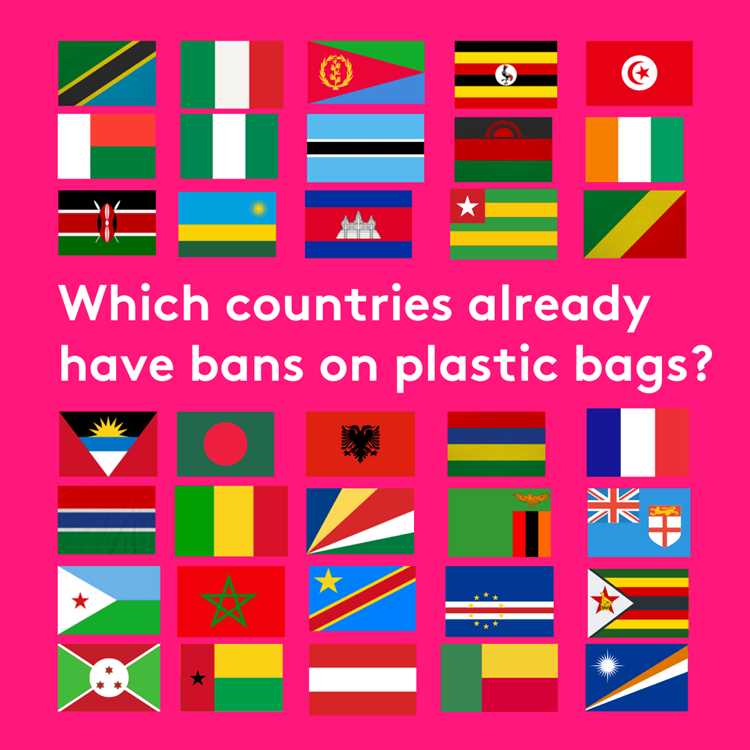In the global fight against plastic pollution, some countries have emerged as true pioneers. These nations recognized the devastating environmental impact of plastic bags early on and took decisive action to ban their use. By implementing these bold measures, they have set an example for other countries to follow and are leading the way towards a more sustainable future.
One of the first countries to ban plastic bags was Bangladesh in 2002. This South Asian nation, known for its beautiful landscapes and rich biodiversity, was facing a severe plastic bag problem. The bags were clogging drains, causing floods, and polluting rivers. In response, the government implemented a ban on the production, importation, and use of plastic bags, becoming one of the earliest pioneers in the fight against plastic pollution.
Another notable pioneer is Rwanda, a small East African country. In 2004, Rwanda imposed a complete ban on plastic bags, becoming one of the first African nations to take such action. The move was driven by a desire to protect the environment and promote a sustainable future. Today, Rwanda is recognized worldwide for its clean streets and commitment to environmental conservation.
In 2008, China, the world’s most populous country, also took a significant step by banning the production, sale, and use of ultra-thin plastic bags. This measure was a response to China’s growing waste problem and its aim to transition to a more circular economy. The ban has been highly effective in reducing plastic waste and has inspired other countries to follow suit.
These countries, along with many others, have shown that it is possible to tackle the plastic bag problem head-on. By implementing innovative policies and educating their citizens, they have paved the way for a more sustainable future. As the global awareness of plastic pollution continues to grow, we can look to these pioneers for inspiration and guidance in our own efforts to protect the planet.
- The Earliest Adopters of Plastic Bag Bans
- Rwanda: A Trailblazer in Environmental Conservation
- Plastic Bag Ban
- Positive Impact
- Global Inspiration
- Bangladesh: Taking a Stand to Protect Its Rivers
- The Future of Bangladesh’s Rivers
- Conclusion
- Ireland: Leading the Way in Europe
- Q&A:
- When did countries start banning plastic bags?
- Which country was the first to take action against plastic bags?
- Did any countries ban plastic bags before Bangladesh?
- Why did countries decide to ban plastic bags?
- Which other countries followed Bangladesh and Ireland in banning plastic bags?
The Earliest Adopters of Plastic Bag Bans
Plastic bag bans have been implemented by various countries around the world, but some nations were pioneers in taking this step to reduce plastic pollution. Here are a few of the earliest adopters:
- Denmark: Denmark was one of the first countries to ban plastic bags in 1993. The ban was introduced as part of a wider environmental strategy focused on waste reduction and recycling.
- Ireland: In 2002, Ireland became the first country to impose a nationwide plastic bag levy. The initiative was a huge success, leading to a drastic reduction in plastic bag usage.
- Bangladesh: Bangladesh implemented a total ban on plastic bags in 2002, following concerns about the impact of plastic waste on the environment and public health. The ban has been largely successful, with alternatives like jute bags gaining popularity.
- Taiwan: Taiwan introduced a ban on free plastic bags in 2003, making it mandatory for retailers to charge for plastic bags. This policy has significantly reduced plastic bag usage and promoted the use of reusable bags among the population.
- South Africa: South Africa implemented a plastic bag ban in 2003, prohibiting the manufacturing and sale of certain types of plastic bags. The ban aimed to address the negative impact of plastic bags on the country’s wildlife and ecosystems.
These countries serve as examples of early adopters who recognized the environmental and health hazards posed by single-use plastic bags and took decisive actions to address the issue. Their efforts have inspired many other nations to follow their lead in banning or reducing plastic bag usage.
Rwanda: A Trailblazer in Environmental Conservation
When it comes to environmental conservation, Rwanda stands out as a true pioneer. The country has emerged as a trailblazer in the fight against plastic pollution, implementing strict regulations and innovative solutions to protect its natural resources.
Plastic Bag Ban
Rwanda was one of the first countries in the world to put a complete ban on plastic bags. In 2004, the government introduced a law that prohibited the manufacturing, importation, sale, and use of plastic bags in the country. This bold move aimed to reduce plastic waste and promote sustainable alternatives.
Rwandans embraced the ban wholeheartedly, understanding the detrimental effects of plastic bags on the environment. It became common to see people carrying reusable bags made from fabric or other biodegradable materials while shopping.
Positive Impact
The ban on plastic bags in Rwanda has had a significant positive impact on the environment. The streets and landscapes are now much cleaner, as plastic bags are no longer littering the streets or clogging drainage systems. The ban has also led to the preservation of wildlife, as animals no longer mistake plastic bags for food.
Moreover, the ban has encouraged innovative solutions in the country. People have started to use banana leaves and paper bags as alternatives, promoting the use of eco-friendly materials. This has not only reduced waste but has also created new economic opportunities for local businesses.
Global Inspiration
Rwanda’s success in banning plastic bags has served as an inspiration for many other countries around the world. Several nations have followed in Rwanda’s footsteps and implemented their own plastic bag bans in an effort to protect the environment.
- In 2008, China implemented a ban on ultra-thin plastic bags.
- Italy introduced a ban on non-biodegradable plastics in 2011.
- Kenya implemented one of the world’s strictest plastic bag bans in 2017.
The example set by Rwanda shows that with determination and collective effort, countries can successfully tackle plastic pollution and pave the way for a greener future.
Bangladesh: Taking a Stand to Protect Its Rivers

Bangladesh, a densely populated country in South Asia, has been at the forefront of the global movement to ban plastic bags. The country has taken a strong stand to protect its rivers, which are a lifeline for millions of people.
Rivers in Bangladesh play a vital role in various aspects of life, including irrigation, transportation, and fishing. However, decades of unchecked pollution, including plastic waste, have severely damaged these water bodies, posing a significant threat to both the environment and public health.
In response to this pressing issue, Bangladesh banned plastic bags in 2002, becoming one of the first countries to take such a bold step. The government implemented the ban to curb plastic pollution and protect the rivers from further degradation.
The ban on plastic bags has had a significant impact on the country’s environment. It has helped in reducing plastic waste in rivers and other water bodies, improving the overall water quality. Additionally, it has contributed to the preservation of aquatic life and the ecosystems that rely on these rivers.
Furthermore, the ban has also led to the creation of alternative solutions, such as the promotion of reusable bags and the use of eco-friendly materials for packaging. This has not only reduced plastic waste but also created new opportunities for local businesses and craftsmen.
Despite the ban, enforcing it has been a challenge due to the widespread use of plastic bags and limited resources for implementation. The government has been working to address these challenges through education and awareness campaigns, stricter regulations, and penalties for violations.
The efforts made by Bangladesh to protect its rivers have set an inspiring example for other countries to follow. It demonstrates the importance of taking proactive measures to combat plastic pollution and protect precious natural resources.
The Future of Bangladesh’s Rivers
While the ban on plastic bags in Bangladesh has been a significant step forward, more efforts are needed to ensure the long-term sustainability of the country’s rivers. This includes improving waste management systems, promoting recycling, and creating a culture of environmental responsibility among the population.
Conclusion
Bangladesh’s early action in banning plastic bags has made a significant impact in protecting its rivers. The country has shown tremendous dedication to preserving its natural resources and serves as a pioneer in the global fight against plastic pollution.
Ireland: Leading the Way in Europe

Ireland has been at the forefront of the fight against plastic bag pollution in Europe. In 2002, the country implemented a groundbreaking plastic bag tax, becoming one of the first countries in the world to do so. The tax imposed a small fee on every plastic bag used by consumers, with the aim of reducing their usage and encouraging the use of more environmentally friendly alternatives.
This initiative was highly successful, leading to a dramatic decrease in plastic bag consumption in Ireland. In the first year alone, the number of plastic bags used dropped by over 90%. The tax sparked a widespread change in consumer behavior, with people opting for reusable bags or choosing to reduce their reliance on bags altogether.
Following the success of the plastic bag tax, Ireland continued to lead by example in tackling plastic pollution. In 2007, the country took another important step by being the first in the European Union to introduce a complete ban on lightweight plastic bags. This ban, which applied to bags with a thickness of less than 15 microns, aimed to further reduce the environmental impact of plastic bags.
The Irish government’s commitment to tackling plastic pollution has set a precedent for other countries. Their innovative approach to reducing plastic bag usage has inspired similar initiatives around the world, showing that change is possible when initiatives are implemented effectively.
In recent years, Ireland has also taken further measures to address plastic pollution, including working towards a complete ban on single-use plastics by 2021. Their proactive stance and leadership in Europe make Ireland a clear pioneer in the fight against plastic bag pollution.
Q&A:
When did countries start banning plastic bags?
Countries started banning plastic bags at different times. Some of the earliest pioneers in banning plastic bags were Bangladesh, which banned them in 2002, and Ireland, which implemented a plastic bag levy in 2002 that significantly reduced their use.
Which country was the first to take action against plastic bags?
Bangladesh was one of the first countries to take action against plastic bags. In 2002, the government implemented a complete ban on plastic bags in order to address the environmental and health risks associated with their use.
Did any countries ban plastic bags before Bangladesh?
Yes, some countries took measures to regulate or ban plastic bags before Bangladesh. For example, Ireland introduced a plastic bag levy in 2002, which effectively reduced their use. However, Bangladesh was one of the first countries to implement a complete ban on plastic bags.
Why did countries decide to ban plastic bags?
Countries decided to ban plastic bags because of the negative environmental impact they have. Plastic bags take hundreds of years to decompose, and they often end up in oceans and waterways, causing harm to marine life. Banning plastic bags is seen as a way to reduce plastic pollution and promote more sustainable alternatives.
Which other countries followed Bangladesh and Ireland in banning plastic bags?
Many other countries have followed in the footsteps of Bangladesh and Ireland in banning or regulating plastic bags. For example, Rwanda banned plastic bags in 2008, and China implemented a ban on ultra-thin plastic bags in 2008. Other countries that have banned or limited the use of plastic bags include Italy, France, and Australia.